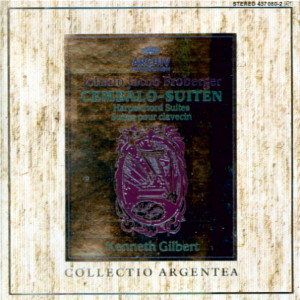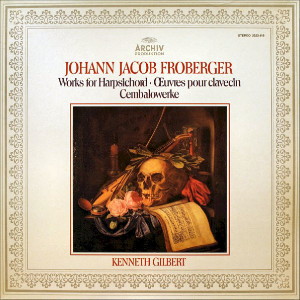 |
|
1 CD -
437 080-2 - (c) 1986
|
 |
| 1 LP -
2533 419 - (p) 1979 |
|
| JOHANN JACOB
FROBERGER - Cembalo-Suiten |
|
|
|
|
|
| Johann
Jacob Froberger (1616-1667) |
|
|
| Lamentation faste
sur la mort très doulourense de Sa
Majesté Impériale, Ferdinand III,
et se loue lentement avec
discrétion (1657) |
6'
01" |
|
| Suite Nr. 1
e-moll (1656) |
10'
54" |
|
| - Allemande |
5'
26" |
|
| - Gigue |
1'
42" |
|
| - Courante |
1'
08" |
|
| - Sarabande |
2'
38" |
|
| Suite Nr. 2 a-Dur
(1656) |
7'
09" |
|
| - Allemande |
3' 06" |
|
| - Gigue |
1' 14" |
|
| - Courante |
1' 08" |
|
| - Sarabande |
1' 41" |
|
| Suite Nr. 3
g-moll (1656) |
9'
51" |
|
| - Allemande |
3' 49" |
|
| - Gigue |
1' 43" |
|
| - Courante |
1' 45" |
|
| - Sarabande |
2' 32" |
|
| Suite Nr. 4
A-moll (1656) |
8'
52" |
|
| - Allemande |
3' 14" |
|
| - Gigue |
1' 59" |
|
| - Courante |
1' 15" |
|
| - Sarabande |
2' 24" |
|
| Suite Nr. 5 D-dur
(1656) |
8'
05" |
|
| - Allemande |
3' 49" |
|
| - Gigue |
1' 12" |
|
| - Courante |
1' 23" |
|
| - Sarabande |
1' 41" |
|
| Suite Nr. 6 C-dur
(1656) |
11'
14" |
|
| - Lamento sopra la
dolorosa perdita della Real Maestà
di Ferdinando IV, Rè dei Romani |
5' 44" |
|
| - Gigue |
1' 24" |
|
| - Courante |
1' 41" |
|
| - Sarabande |
2' 25" |
|
|
|
|
| Kenneth Gilbert,
Cembalo |
Instrument: Bellot le
père, de 1729 |
|
|
Musée
Municipal des
Beaux-Arts de Chartres. |
|
|
Un
clavier manuel, sol-ut, 4½
octaves, deux 8' registres. |
|
|
Restauré
en 1976 par Hubert Bédard. |
|
|
Accord:
tempérament inégal avec tierces
majeurs justes. |
|
|
|
|
|
Luogo
e data di registrazione |
|
Musée,
Chartres (Francia) - aprile 1978 |
|
|
Registrazione:
live / studio |
|
studio |
|
|
Producer /
Engineer |
|
Andreas
Holschneider / Heinz Wildhagen |
|
|
Prima Edizione
LP |
|
Archiv
- 2533 419 - (1 lp) - durata 62'
25" - (p) 1979 - Analogico |
|
|
Edizione
"Collectio" CD |
|
Archiv
- 437 080-2 - (1 cd) - durata 62'
25" - (c) 1986 - ADD |
|
|
Note |
|
-
|
|
|
|
|
FROBERGER:
HARPSICHORD
SUITES
Shortly
before the musically
talented and accomplished
Ferdinand III was elected
Holy Roman Emperor in 1632
the young Johann
Jacob
Froberger took up his duties
as an organist at the Vienna
court chapel, continuing in
imperial service for the
next 20 years. However, he
often spent long periods
away from Vienna, beginning
in the late summer of 1637
when he received a stipend
to study with Frescobaldi in
Rome. Almost four years
later he returned to Vienna
but seems from 1645 to 1653
to have travelled
extensively through various
German states, Italy, the
Low Countries, France and
even England. For a time he
was attached to the court of
Ferdinand’s brother,
Archduke Leopold, Governor
of the Spanish Netherlands,
in Brussels. From 1653 until
just after the Emperor’s
death in 1657, Froberger was
again at the Viennese court.
His relations with his
imperial patron seem to have
been very harmonious, marked
by mutual respect and
sincere affection. Two of
the beautifully decorated
autograph volumes of
Froberger’s music prepared
for presentation to
Ferdinand are still
preserved in the Austrian
National Library; alas, at
least two more have been
lost. We know from a letter
dated September 1649, from
Froberger to his old friend
in Rome, the remarkable Jesuit
polymath Athanasius Kircher,
that the composer was even
accorded long private
audiences to discuss fine
points of contrapuntal
technique with his patron.
Ferdinand’s melomania even
extended to taking the
entire Vienna court opera
along when travelling on
state business. His
bedchamber always contained
a small keyboard instrument
for his personal use.
His successor, Leopold I,
was also very musical, but
he permitted Froberger to be
dismissed at the end of June
1657, even though most of
the Imperial Chapel
musicians were kept on.
The best evidence of the
close bonds which linked
Froberger and Ferdinand III
is provided by the
deeply-felt Lamentation
in his memory. This
unquestionably genuine piece
has survived only in a
single manuscript of the
early 18th century. The
composer consciously chose
the unusual key of F minor
and the archaic
three-section form, neither
ofwhich occurs elsewhere in
his music, and ended the
piece with a thrice-repeated
F, all in tribute to the
departed.
Regardless whether he
created the genre, Froberger
is indisputably the earliest
master of the keyboard
suite. Some 30 from his hand
have come down to us. The
six recorded here are found
in the autograph volume
presented to Ferdinand III
in 1656. Each contains the
typical four movements of
the Baroque keyboard suite,
but in the unusual order
which Froberger came to
prefer after 1649, with the
Gigue as the second rather
than fourth movement. As
with his earlier datable
suites in the 1649
autograph, these 1656 dance
sequences bear a close
stylistic resemblance to
similar pieces written by
French lutenists of the
mid-17th century, which
circulated widely throughout
Europe.
The opening Allemandes,
which in a sense also serve
as preludes, are clearly
written in a style luthé
characterized by
widely-spaced arpeggiated
chords and ingenious little
touches of
quasi-counterpoint. There is
no trace of the even flowing
sixteenth notes
(semiquavers) associated
with this dance in the Bach
and Handel period. The
opening movement of the
final suite in the 1656 set
is another Froberger elegy,
this one for the elder son
of Ferdinand III who died in
1654. (The title is
explained by the custom of
referring to the
heir-presumptive to the
imperial throne as the “King
of the Romans”.)
The gigues in the six suites
also employ the French
lutenist’s favoured rhythmic
patterns which prefer the
more individualized, jerky
dotted rhythms to the
sequences of even triplets
associated with the familiar
Italian variety of jig. (The
peculiar custom of often
notating these gigues in
duple metre and thus
concealing the intended
triple or compound time, was
long a puzzlement to
performers who could make
little sense and certainly
nothing like a jig out of
the literal notation.)
The graceful courantes are
similarly cast in the Gallic
mould. These are gliding
rather than running dances,
like the Italian variety of
corrente. Froberger
makes subtle rhythmic play
with the ambiguity of the
metre, which alternates
between units of thrice two
beats and twice three beats,
respectively. The concluding
sarabandes are highly
stylized dances that bring
the suites to a dignified
close. Restoring the
original order of the
movements profoundly alters
the effect on the listener
of the suite as a whole.
The uniquely personal
element in Froberger’s
suites, the intimacy and
intensity of expression, set
him apart from the great
mass of his contemporaries
and followers, with the
notable exception of his
friend and admirer, Louis
Couperin. The suites, as
well as the composer’s much
esteemed polyphonic
compositions, were
circulated widely in
manuscript, and were so
highly esteemed that three
decades after his death, two
editions of ten suites
(including two of the 1656
set) appeared simultaneously
in Amsterdam. (It was these
very publications which
printed the suites in the
conventional order, with the
gigue last, that misled
later editors and performers
into ignoring Froberger’s
express preference.) In an
age almost exclusively taken
up with the music of its own
time, these posthumous
printings were an
extraordinary tribute.
In our own time the
reawakening of interest in
the music of the 17th
century has been relatively
recent as compared with the
attention paid to slightly
later periods. In the domain
of the harpsichord,
especially, this has been
most regrettable because
much of the most moving and
impressive repertoire for
the instrument dates from
the 17th century. Froberger
can be viewed as a central figure
in the constellation of
composers for keyboard in
this period. He plays
a special role, a
particularly German one in
uniting and synthesizing
various stylistic trends of
his time. He is the link
between the school of
Frescobaldi and the early clavcinistes.
But important as all this
undoubtedly is to the
historian of music, to the
sensitive listener
Froberger’s ultimate claim
to greatness rests primarily
on his capacity to convey to
us the intense emotions that
he was able to express in a
few bars lasting but a
moment or two. In this sense
he was truly unique.
Howard
Schott
|
|